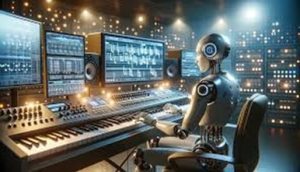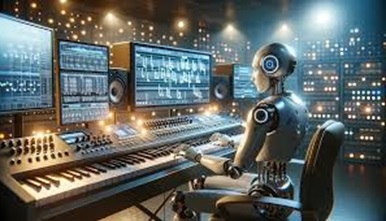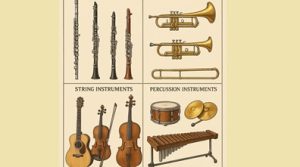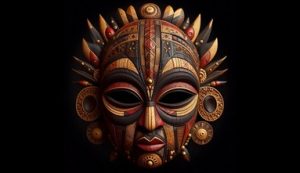AI in Music 2025: Creative Tool or Copycat?
AI in Music 2025: Creative Tool or Copycat?

Here’s What Artists and Lawmakers Say
Artificial Intelligence (AI) has moved from being a behind-the-scenes experiment to a central force in the music industry. By 2025, AI will no longer be just a background tool for sound design or auto-tune. It is now writing lyrics, producing beats, and even performing full-length concerts. From TikTok hits to Grammy-nominated albums, AI’s fingerprint is everywhere. But as the technology expands, so do the debates over ownership, creativity, and legality.
This blog explores the rise of AI in music—from how it helps artists create new work to the legal battles shaping its future.
How AI is Changing Music Creation
- Co-Creation with Artists
AI is now being used as a creative partner. Musicians feed algorithms with their old tracks, and the system generates new melodies in their style. Instead of starting from scratch, artists can build on these AI suggestions. For example, electronic producers are using AI tools like Amper Music and AIVA to create symphonies in minutes.
The biggest change is speed. What once took weeks in a studio can now take hours. AI handles the repetitive tasks—like mixing or chord progressions—so artists can focus on storytelling and performance.
AI-Generated Lyrics
Lyric-writing is another area where AI is making waves. Systems trained on millions of songs can spit out verses based on a theme, mood, or rhyme scheme. Platforms like ChatGPT for Music or LyricStudio allow artists to brainstorm faster.
Pop stars are already using AI-generated lyrics as drafts before refining them. For independent artists with fewer resources, this is a game-changer. It provides access to professional-quality writing tools that used to cost thousands.
AI as Performer
AI is not limited to creation—it is stepping onto the stage. Virtual artists like FN Meka and AI-generated pop stars in Japan are pulling crowds and gaining streaming numbers. These acts never miss a note, never tire, and can “tour” globally through holograms.
Some see this as the future of music, while others argue it devalues human artistry. But either way, AI performers are becoming part of the industry fabric.
The Business Side: Why the Industry Loves AI
Music labels are embracing AI for one reason: profit. AI reduces production costs, speeds up releases, and helps labels test what audiences want.
Streaming platforms like Spotify are also experimenting with AI-driven recommendations that create ultra-personalized playlists. AI DJs can learn your mood in real time, adjusting tracks to fit your workout, study session, or road trip.
For marketing, AI tools generate cover art, write social media posts, and even predict hit potential. For labels, AI isn’t just music—it’s business intelligence.
The Dark Side: Ethical and Legal Challenges
While AI brings opportunities, it also creates problems. The most pressing issues are around ownership, copyright, and artist rights.
- Who Owns AI-Created Music?
If an AI system writes a song, who owns the rights? The programmer? The artist who gave it prompts? Or the AI itself? Current copyright laws are not built for non-human creators. This legal gray area has already led to disputes.
Some courts reject AI-created works as copyrightable. Others say the human who guides the AI should hold ownership. Until there’s clarity, many musicians are cautious about fully adopting AI.
The Rise of Deepfake Vocals
One of the hottest debates in 2025 is AI-generated vocals. Fans can now clone famous voices with tools like Voicify or ElevenLabs. Last year, a viral track used a Drake-style AI voice and hit millions of streams before being taken down.
This sparked outrage among artists. Many called it exploitation, while fans argued it was creativity. In response, lawmakers in the U.S. are pushing the “No Fakes Act”, which would make unauthorized use of an artist’s voice illegal. Similar discussions are happening in the UK and the EU.
How Artists Are Responding
Not all musicians are against AI. Some embrace it as a tool to expand creativity. For example:
- Indie artists use AI for low-budget music videos, promo campaigns, and quick demos.
- Producers blend AI beats with human improvisation to create hybrid tracks.
On the flip side, many established artists are fighting back. They argue AI cheapens their craft and threatens careers. The divide often falls along generational lines, with younger artists more open to experimenting.
AI Music in Culture and Society
AI music is no longer confined to studios. It’s shaping culture at large.
- TikTok Trends: Many viral sounds come from AI mashups or remixes.
- Film & Gaming: Studios are replacing stock music with AI-generated scores.
- Live Events: Festivals are experimenting with AI-driven light shows synced to music in real time.
Fans are divided. Some love the innovation, while others feel it strips away the emotional imperfections that make music human. This cultural tension mirrors broader debates about AI in society.

Conclusion
In 2025, the music industry stands at a crossroads. Will AI remain a powerful creative partner, or will it overshadow human artists? The answer may depend on how lawmakers, labels, and musicians navigate this fast-changing landscape.
What’s certain is that AI is no longer a background experiment. It is the headline act—and everyone is watching.
FAQs
Q: Can AI replace human musicians?
AI can create music, but it lacks the emotional depth of human performance. Most experts see it as a tool, not a replacement.
Q: What is the “No Fakes Act”?
It is a proposed U.S. law that would prevent unauthorized use of an artist’s voice or likeness through AI.
Q: Are fans open to AI-generated songs?
Yes and no. Younger listeners often embrace them, while traditionalists prefer human-made tracks.
Q: How are artists using AI today?
They use it for lyric-writing, beat-making, demos, and even marketing campaigns.





